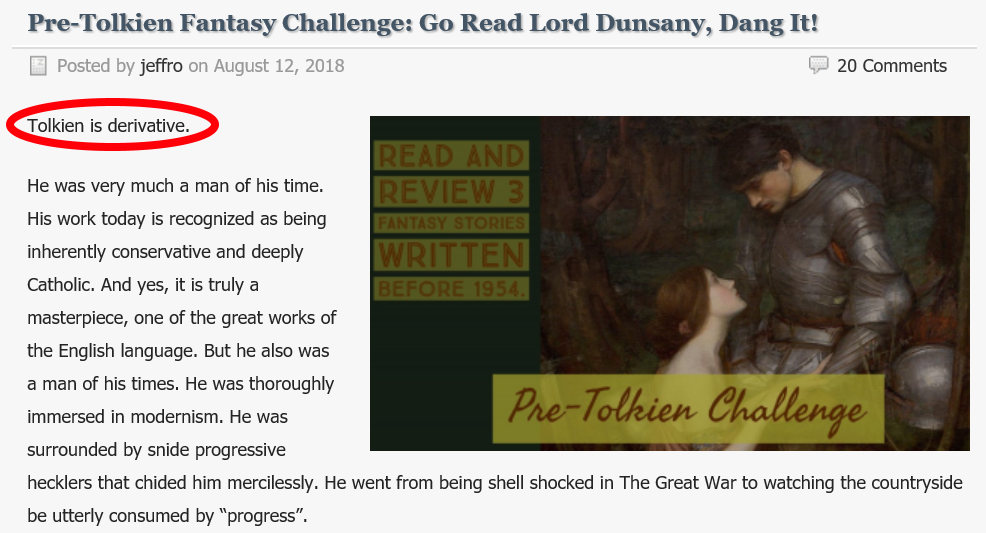Another Volley in the Long Conversation
Wednesday , 22, August 2018 Short Fiction, Uncategorized 1 CommentBeyond the ephemeral conversations we have in our everyday lives, there lies a longer and slower form of conversation in the written word. The vast connections possible through most social media hold some charm, but the immediacy of the medium that gives it that thrill of contact lacks the deep and ponderous thought of slower form debates such as those that can still be found bouncing around the blog-o-sphere.

Deeper and more impactful than essays such as those found in old-style editorials and new-style blog essays, and of particular interest to readers of a blog such as this, are those that occur as underlying meaning behind the curtains of tales of the fantastic. Tolkien writes an uplifting tale of the wonder of the worldly realm, the quiet heroism of the common man, and the value that can be added to the world when a rightful king exercises due diligence in the care of his people, and George R. R. Martin responds with an argument that the world stinks, people are terrible, the even the best of rulers is motivated by his own petty and selfish desires.
Spoilers ahead for Schulyer Hernstrom’s novella, Mortu and Kyrus in the White City. At only 83 pages, you’ve plenty of time to pick up a copy and read through it before cycling back to the Castalia House blog.
Much has been written about Ursula K. LeGuin’s The Ones Who Walk Away from Omelas, that Hugo winning story about a utopia powered by the torture of a small child, but most of the responses play the game according to the ham-fisted trolley-car rules of LeGuin’s central premise. As is the case with most of these zero-sum games, the point of the exercise is to condition the analyst, in this case the reader, to rationalize and justify which of two evil acts to commit. To my knowledge, every literary response to Omelas penned to date has accepted the premise and landed on one side or the other of the question of whether to save the child and kill the Utopian dream or allow the torture to continue and save the Utopia. The easy answer to the conundrum is not to play.
When faced with a similar challenge, my preferred method has been to demand additional information before answering. My queries as the skin color of the citizens of this utopia versus that of the child typically, for example, often provide an awkward silence into which it is possible to explain the insidious nature of the exercise itself. When pressed, insisting on answers to ever more irrelevant and mocking clarifications and embellishments can also lead to a demonstration of the only way to win such games – not to play them at all, but to use them as grist for your own games.
Enter Schulyer Hernstrom’s novella Mortu and Kyrus in the White City, which takes the false dichotomy of Omelas, grinds that grist up, and uses it to bake a post-apocalyptic tale of a wasteland warrior who has no time for such games.

With one major surprise ruined – a hero’s natural response to the Omelas proposition – we can delve into what makes this story worth reading even knowing at the outset that you’re getting a fun and inspirational and satisfying conclusion.
As is the case with all of the best writers, the destination matters less than the journey. Hernstrom’s voice echoes in the stoic silences of the genetically designed warrior, Mortu, and that’s not the contradiction it sounds like. Hernstrom paints the dusty lands of the wastes and the alien splendor of the White City with an economy of words that imparts a wealth of information about the setting, its history, and the wanderers who pass through both in this chapter in a longer quest.
Mortu represents the tank of the duo, the child of a race of genetically modified warriors, and a pagan of sorts. He rides a beefy mechanical hog through the wastes, joined by a holy man, a monk struggling to reclaim man’s spiritual inheritance, lost during one of the several cycles of civilizational rise and fall. The back and forth between the pagan warrior and the monkish philosopher strikes a nice point-counterpoint that provides both exposition and self-reflection, and provides a depth to the story that makes the conundrum of what to do with the White City as difficult a proposition as solving a knock-knock joke. Although Mortu’s solution can only lead to one outcome, here again Hernstrom manages to make the read suspenseful through his evocative prose and talent for action that hangs in the balance until the very last moment.
Clearly the opening chapter of a longer story, Mortu and Kyrus manages to provide subtle glimpses into the wider world outside of the wastes and the White City that give the story both a solid foundation, and a leave the reader wanting to know more about Mortu, about Kyrus, and about the strange events that led to the fall of Mankind, and the even stranger events that have allowed the rebirth of Mankind and his reclamation of his birthright. Hopefully, we won’t have to wait long for answers to those questions.
And given the finality of Hernstrom’s response to Omelas, it wouldn’t be so bad to read a story that responds to Hernstrom’s cutting of LeGuin’s Gordian Knot, either!
Thank you for the recommendation.
Hernstrom is an impressive talent and Mortu and Kyrus are a memorable and unusual pairing. The story builds in an assured and measured way to its inevitable conclusion.
“Justice does not come from a blade’s edge!”
“It most certainly does.”
Bracing, magnificent stuff.